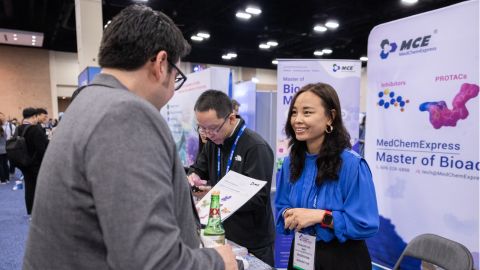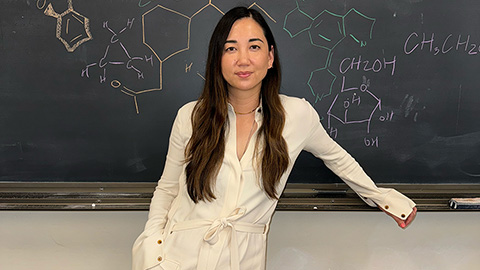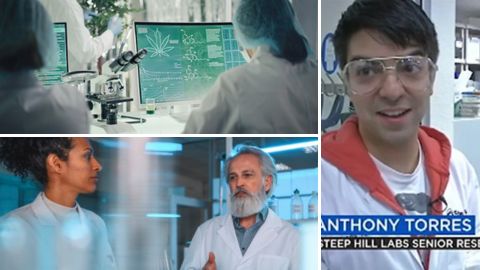“You’ve got … to get outside of your comfort zone”
Wayne Fairbrother leads a department at Genentech tasked with validating disease-associated targets and determining whether they are feasible for drug development. The biophysicist, who was raised in New Zealand and has lived in California for decades, sat down virtually with ASBMB Today to talk about his career. The interview has been edited.

Name: Wayne Fairbrother
Current position: Director and senior staff scientist, Early Discovery Biochemistry, Genentech
Career path:
- D.Phil., Oxford University, 1989
- Postdoc: Scripps Research Institute
- First job outside academia: Scientist, Genentech
Favorite molecule or protein: Bcl-2
How did you come to work at Genentech?
It's an interesting story. Genentech was looking to set up a protein nuclear magnetic resonance group back in the early 1990s. I applied for the position and, as many people do, got a polite "thank you, but no thank you" letter. Two or three months later I got a call from the director of protein engineering, who had gotten my name from one of their consultants, a senior person in protein NMR who I knew — and I got the job.
I like to tell that story to people looking for positions. You can get lost in the bureaucracy, especially nowadays when everything is computer searched, so having a network definitely helps.
Any other advice you often give?
I tell people going into industry the one thing I can guarantee is that in five years they'll be working on something completely different. Things progress and come in and out of favor for various reasons, whether it's science, strategic decisions or competition. So you need to be flexible.
That, and collaboration. You can't do anything without working with colleagues who have different expertise to put the pieces together and solve a problem. You've got to be prepared to get outside of your comfort zone.
How has Genentech changed in your time there?
The company has gotten bigger. In the early days we'd interact with everyone; now we're spread over a larger campus, and it's harder to know what's going on everywhere at all times. You need to be more proactive in keeping your finger on the pulse. Also, the pendulum has swung a little from basic discovery to more translational research. Of course, we're all about making therapeutics for unmet medical needs, so translation is critical.
Is there a project you're especially proud to have worked on?
There's a clear winner there: a collaboration with Abbot Labs (now AbbVie) and the Walter and Eliza Hall Institute in Australia that resulted in a treatment for chronic lymphocytic leukemia and acute myeloid leukemia. It's a molecule that specifically targets Bcl-2, which for a long time was considered undruggable. It was an exciting project — and it's always fun to meet patients who have benefited from something that you've touched. It reminds you why we do what we do.
Is there such a thing as an undruggable target?
I don't think there is. It may be true to say it's not druggable with the technology now, but technology is evolving. When a target is considered undruggable, it just means that we haven't discovered the way to drug it yet. That's the way I like to think.
(Would you like to suggest an ASBMB member who works in industry for a Five Questions interview? Send an email to ASBMB Today.)
Enjoy reading ASBMB Today?
Become a member to receive the print edition four times a year and the digital edition monthly.
Learn moreFeatured jobs
from the ASBMB career center
Get the latest from ASBMB Today
Enter your email address, and we’ll send you a weekly email with recent articles, interviews and more.
Latest in Industry
Industry highlights or most popular articles

Black excellence in biotech: Shaping the future of an industry
This Black History Month, we highlight the impact of DEI initiatives, trailblazing scientists and industry leaders working to create a more inclusive and scientific community. Discover how you can be part of the movement.

Attend ASBMB’s career and education fair
Attending the ASBMB career and education fair is a great way to explore new opportunities, make valuable connections and gain insights into potential career paths.

Benefits of attending a large scientific conference
Researchers have a lot of choices when it comes to conferences and symposia. A large conference like the ASBMB Annual Meeting offers myriad opportunities, such as poster sessions, top research talks, social events, workshops, vendor booths and more.

Biotech startup worms its way into therapeutics
Andrea Choe's company, Holoclara, has created an anti-inflammatory drug based on a molecule from worms.

How military forensic scientists use DNA to solve mysteries
Learn how two analysts at the Armed Forces DNA Identification Laboratory use molecular biology and genetics to identify the remains of fallen troops.

Careers in industry: A year in review
Careers columnist Inayah Entzminger looks back at 12 months of interviews, advice and lists of resources.

